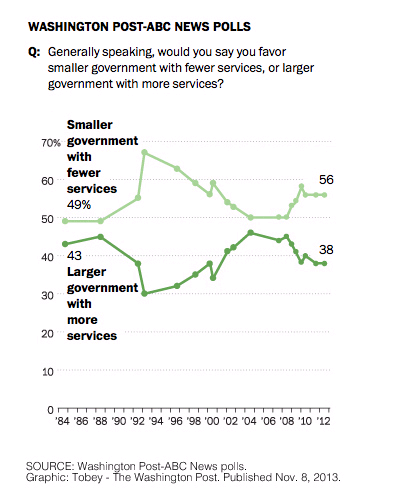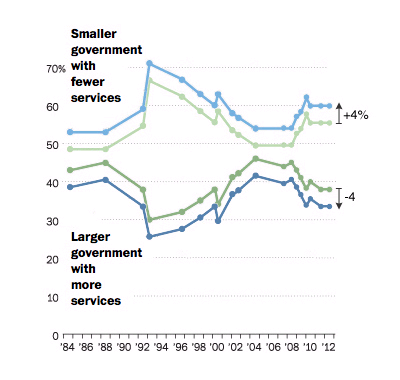Why We Shouldn’t Expand Government
Fareed Zakaria’s new column is titled (at least on the Washington Post website) “Why Americans Hate Their Government” or (in the paper) “Why We Hate our Government.” But some of the points he makes might better be seen as reasons not to keep on expanding a government that has grown beyond its competence.
Washington is having one of its odd debates as to whether the Obama administration’s rollout of HealthCare.gov was worse than the Bush administration’s response to Hurricane Katrina. But whatever the answer, if there is one, the real story is that both are examples of a major, and depressing, trend: the declining competence of the federal government. Paul Volcker, former chairman of the Federal Reserve, has been saying for years that most Americans believe their government can no longer act effectively and that this erosion of competence, and hence confidence, is a profound problem.
“The federal service is suffering its greatest crisis since it was founded in the first moments of the republic,” scholar Paul Light writes in his book “A Government Ill Executed.”
Over the past decade, the federal government has had several major challenges: Iraq, Afghanistan, a new homeland security system, Katrina and Obamacare. In almost every case, its performance has been plagued with mismanagement, massive cost overruns and long delays.
Zakaria argues that this was not always the case: “In the 1940s, ’50s and ’60s, federal agencies were often lean, well managed and surprisingly effective.” Maybe so, depending on your metric. But of course in those decades the federal government had not yet undertaken cradle-to-grave responsibilities. Maybe the lesson is that if you want competent government, you should limit it to manageable tasks.
On the other hand,
If you want the federal government to tax (and borrow) and transfer $3.6 trillion a year, if you want it to build housing for the poor and give special benefits to Alaska Natives, if you want it to supply Americans with health care and school lunches and retirement security and local bike paths, then you have to accept that such programs come with incentive problems, politicization, corruption, and waste.
In that case, this is the business you have chosen.
Posted on November 22, 2013 Posted to Cato@Liberty
Dallas Buyers Club Is a Terrific Libertarian Movie
Tim Lynch was right. Dallas Buyers Club is a terrific movie with a strong libertarian message about self-help, entrepreneurship, overbearing and even lethal regulation, and social tolerance. Matthew McConaughey, almost unrecognizable after losing 40 pounds, plays Ron Woodroof, a homophobic electrician in 1985 who learns he has AIDS and has 30 days to live. There’s lots of strong language in his denunciation of the kinds of people who get AIDS, which he certainly is not. But after doing some research, he asks his doctor for AZT, the only drug for HIV/AIDS then available, but he wasn’t eligible for the trials then in process. He turns to the black market, finds his way to Mexico, encounters a doctor who tells him that AZT is toxic and that there are better vitamins and drugs, and beats his original prognosis. As it occurs to him that there are plenty of other people in Dallas who could use these drugs, he sees an opportunity to make some money – if he can only learn to deal with gay people.
Soon he’s setting up a “buyers club,” in an attempt to evade FDA regulations on selling illegal or non-approved drugs. He’s got customers – oops, potential members – lining up. He’s on planes to Japan and Amsterdam to get drugs not available in the United States. And at every turn he’s impeded and harassed by the FDA, which insists that people with terminal illnesses just accept their fate. Can’t have them taking drugs that might be dangerous! You’ll be surprised to see how many armed FDA agents it takes to raid a storefront clinic operated by two dying men.
Here’s a Cato study on AIDS and the FDA from 1986. Here’s the original 1992 magazine story about the Dallas Buyers Club, published just before Ron Woodroof died.
Go see Dallas Buyers Club.
Posted on November 12, 2013 Posted to Cato@Liberty
Demand for Smaller Government Remains Strong
Whether the recent election was good news for tea party Republicans, establishment Republicans, or activist Democrats, the Washington Post notes that
Obama’s larger project of redefining what government should do has been stymied by steady Republican opposition and public disenchantment with political leaders….While Obama has framed the question in different ways over the past five years, he has consistently sought to convince Americans that well-run government is uniquely positioned to help secure their economic prosperity.
A sidebar graphic reminds us that
Majorities have consistently preferred a smaller government with fewer services to a larger one with more services.
Here’s the chart accompanying the article:

The “smaller government” question is incomplete. It offers respondents a benefit of larger government–“more services”–but it doesn’t mention that the cost of “larger government with more services” is higher taxes. The question ought to give both the cost and the benefit for each option. A few years ago a Rasmussen poll did ask the question that way. The results were that 64 percent of voters said that they prefer smaller government with fewer services and lower taxes, while only 22 percent would rather see a more active government with more services and higher taxes. A similar poll around the same time, without the information on taxes, found a margin of 59 to 26 percent. So it’s reasonable to conclude that if you remind respondents that “more services” means higher taxes, the margin by which people prefer smaller government rises by about 9 points. With that in mind, I’ve adjusted the Post’s poll numbers by four points in each direction, to approximate what the numbers would look like if the Post included “higher taxes” in its question. The revised figure makes even more clear why presidents have difficulty persuading people to increase the size of government:

Posted on November 11, 2013 Posted to Cato@Liberty
David Boaz discusses the Cato Institute’s Mission Statement
Posted on November 11, 2013 Posted to Cato@Liberty



